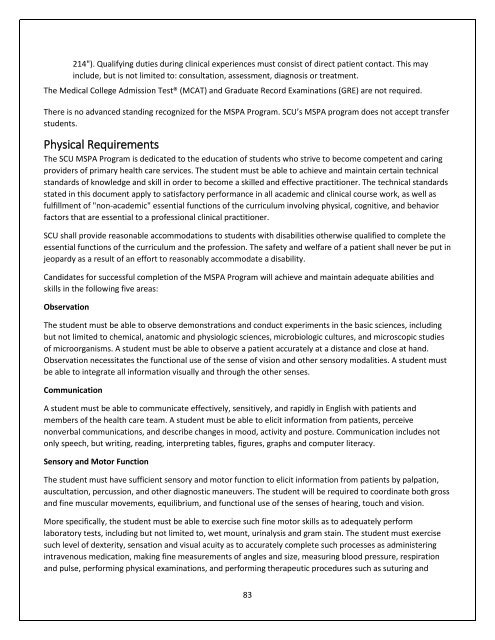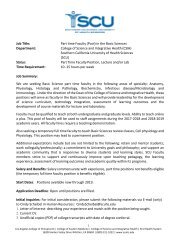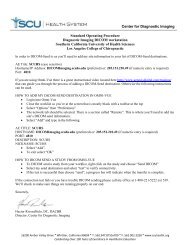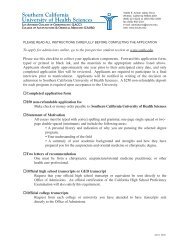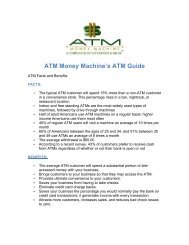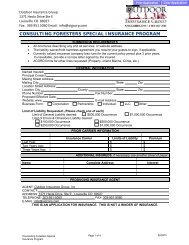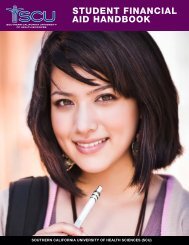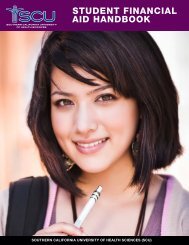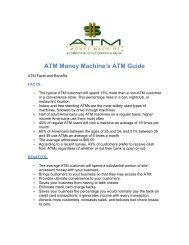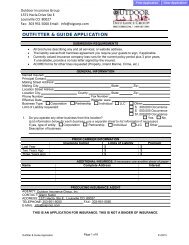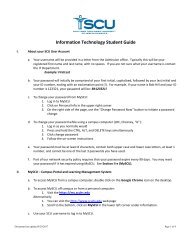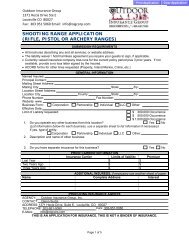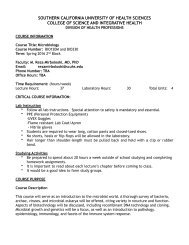Vision, Mission, and Guiding Principles for SCUHS
Southern California University of Health Sciences will be recognized as the premier evidence-based integrative healthcare university. in this PDF we are discussing about our Vision, Mission, and Guiding Principles. Please have a look. you can also go with this link: https://bit.ly/2JuIItL
Southern California University of Health Sciences will be recognized as the premier evidence-based integrative healthcare university. in this PDF we are discussing about our Vision, Mission, and Guiding Principles. Please have a look. you can also go with this link: https://bit.ly/2JuIItL
Create successful ePaper yourself
Turn your PDF publications into a flip-book with our unique Google optimized e-Paper software.
214"). Qualifying duties during clinical experiences must consist of direct patient contact. This may<br />
include, but is not limited to: consultation, assessment, diagnosis or treatment.<br />
The Medical College Admission Test® (MCAT) <strong>and</strong> Graduate Record Examinations (GRE) are not required.<br />
There is no advanced st<strong>and</strong>ing recognized <strong>for</strong> the MSPA Program. SCU’s MSPA program does not accept transfer<br />
students.<br />
Physical Requirements<br />
The SCU MSPA Program is dedicated to the education of students who strive to become competent <strong>and</strong> caring<br />
providers of primary health care services. The student must be able to achieve <strong>and</strong> maintain certain technical<br />
st<strong>and</strong>ards of knowledge <strong>and</strong> skill in order to become a skilled <strong>and</strong> effective practitioner. The technical st<strong>and</strong>ards<br />
stated in this document apply to satisfactory per<strong>for</strong>mance in all academic <strong>and</strong> clinical course work, as well as<br />
fulfillment of "non-academic" essential functions of the curriculum involving physical, cognitive, <strong>and</strong> behavior<br />
factors that are essential to a professional clinical practitioner.<br />
SCU shall provide reasonable accommodations to students with disabilities otherwise qualified to complete the<br />
essential functions of the curriculum <strong>and</strong> the profession. The safety <strong>and</strong> welfare of a patient shall never be put in<br />
jeopardy as a result of an ef<strong>for</strong>t to reasonably accommodate a disability.<br />
C<strong>and</strong>idates <strong>for</strong> successful completion of the MSPA Program will achieve <strong>and</strong> maintain adequate abilities <strong>and</strong><br />
skills in the following five areas:<br />
Observation<br />
The student must be able to observe demonstrations <strong>and</strong> conduct experiments in the basic sciences, including<br />
but not limited to chemical, anatomic <strong>and</strong> physiologic sciences, microbiologic cultures, <strong>and</strong> microscopic studies<br />
of microorganisms. A student must be able to observe a patient accurately at a distance <strong>and</strong> close at h<strong>and</strong>.<br />
Observation necessitates the functional use of the sense of vision <strong>and</strong> other sensory modalities. A student must<br />
be able to integrate all in<strong>for</strong>mation visually <strong>and</strong> through the other senses.<br />
Communication<br />
A student must be able to communicate effectively, sensitively, <strong>and</strong> rapidly in English with patients <strong>and</strong><br />
members of the health care team. A student must be able to elicit in<strong>for</strong>mation from patients, perceive<br />
nonverbal communications, <strong>and</strong> describe changes in mood, activity <strong>and</strong> posture. Communication includes not<br />
only speech, but writing, reading, interpreting tables, figures, graphs <strong>and</strong> computer literacy.<br />
Sensory <strong>and</strong> Motor Function<br />
The student must have sufficient sensory <strong>and</strong> motor function to elicit in<strong>for</strong>mation from patients by palpation,<br />
auscultation, percussion, <strong>and</strong> other diagnostic maneuvers. The student will be required to coordinate both gross<br />
<strong>and</strong> fine muscular movements, equilibrium, <strong>and</strong> functional use of the senses of hearing, touch <strong>and</strong> vision.<br />
More specifically, the student must be able to exercise such fine motor skills as to adequately per<strong>for</strong>m<br />
laboratory tests, including but not limited to, wet mount, urinalysis <strong>and</strong> gram stain. The student must exercise<br />
such level of dexterity, sensation <strong>and</strong> visual acuity as to accurately complete such processes as administering<br />
intravenous medication, making fine measurements of angles <strong>and</strong> size, measuring blood pressure, respiration<br />
<strong>and</strong> pulse, per<strong>for</strong>ming physical examinations, <strong>and</strong> per<strong>for</strong>ming therapeutic procedures such as suturing <strong>and</strong><br />
83


